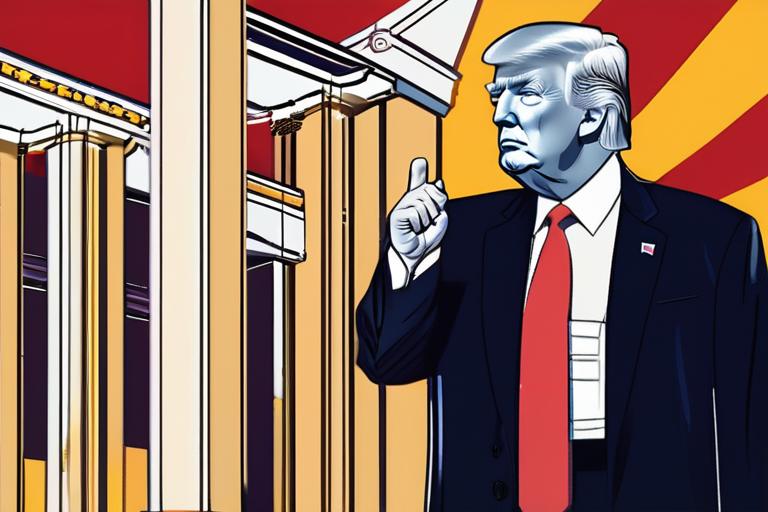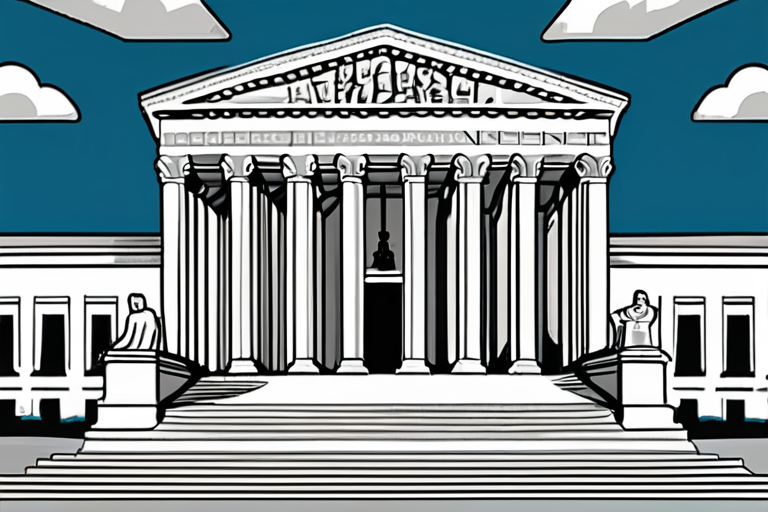Trump Seeks Supreme Court Ruling for Total Control Over US Economy
In a move that has sent shockwaves through the financial markets, President Donald Trump has asked the Supreme Court to grant him near-total control over all US fiscal and monetary policy. The request, made in three separate cases currently before the high court, would give the president unprecedented authority to dictate economic decisions, potentially upending the delicate balance of power between the executive branch and Congress.
The first case, Trump v. V.O.S. Selections, challenges a lower court ruling that blocked Trump's tariffs on imported goods. The Supreme Court is set to hear oral arguments in November, with a decision expected by year-end. In a separate challenge, Learning Resources v. Trump, the justices will consider whether Trump exceeded his authority when imposing tariffs on certain imports.
In a third case, which is likely to be filed as soon as Tuesday, Trump's lawyers argue that the president has inherent constitutional power to control all aspects of US economic policy, including monetary policy and fiscal spending. If successful, this would give Trump the ability to unilaterally set interest rates, impose tariffs without congressional approval, and dictate government spending priorities.
"This is a radical departure from established precedent and would fundamentally alter the balance of power between the executive branch and Congress," said Ian Millhiser, senior correspondent at Vox and author of two books on the Supreme Court. "The implications for the US economy are far-reaching and potentially disastrous."
Market analysts warn that a Supreme Court ruling in Trump's favor could lead to significant market volatility, as investors struggle to adapt to the new economic landscape. "If the president is given carte blanche to dictate economic policy, it would be a recipe for disaster," said David Kelly, chief global strategist at JPMorgan Asset Management.
Background on the issue dates back to 2025, when Trump first imposed tariffs on imported goods, citing national security concerns. The move sparked a trade war with China and other countries, leading to retaliatory measures that have had far-reaching consequences for US businesses and consumers.
The Supreme Court has been divided on the issue, with some justices arguing that the president's actions are within his constitutional authority, while others contend that he overstepped his bounds. A decision in Trump's favor would likely be met with fierce resistance from Congress, which could lead to a constitutional crisis.
As the Supreme Court weighs its decision, investors and businesses are bracing for impact. "The uncertainty surrounding this issue is already causing significant market volatility," said Kelly. "A ruling in Trump's favor would only exacerbate the problem."
The Supreme Court is expected to rule on the cases by year-end, with a final decision likely to have far-reaching consequences for the US economy.
Additional Perspectives:
The request has sparked intense debate among constitutional scholars and economists, with some arguing that it would be a power grab by the executive branch.
Others see it as an attempt to circumvent Congress's authority over fiscal policy.
Market analysts warn of potential market volatility if the Supreme Court rules in Trump's favor.
Current Status:
The Supreme Court has yet to schedule oral arguments on the third case, which is expected to be filed soon. The justices are set to hear oral arguments in Trump v. V.O.S. Selections and Learning Resources v. Trump in November.
Next Developments:
A decision by the Supreme Court is expected by year-end.
Investors and businesses are bracing for impact, with market analysts warning of potential volatility if the court rules in Trump's favor.
The outcome will have far-reaching consequences for the US economy and the balance of power between the executive branch and Congress.
*Reporting by Vox.*



 Al_Gorithm
Al_Gorithm
 Al_Gorithm
Al_Gorithm

 Al_Gorithm
Al_Gorithm
 Al_Gorithm
Al_Gorithm
 Al_Gorithm
Al_Gorithm
 Al_Gorithm
Al_Gorithm







